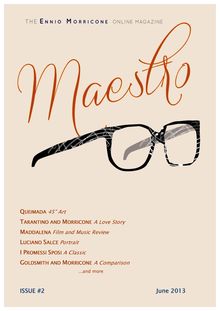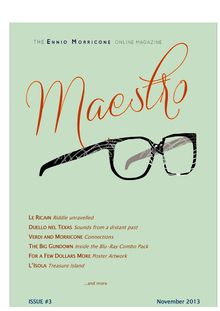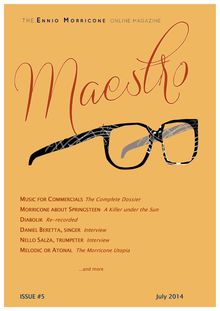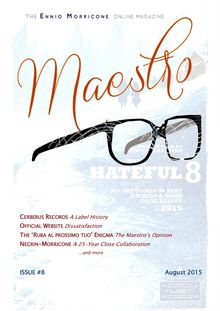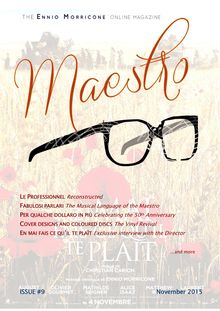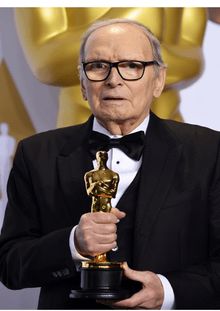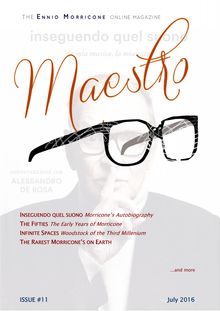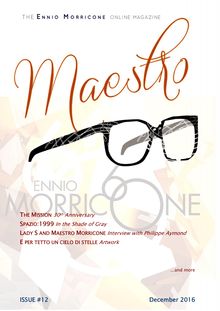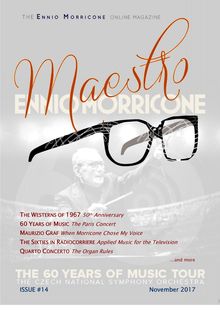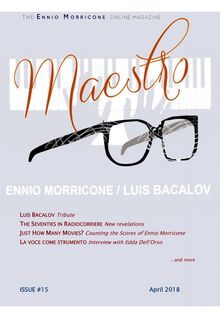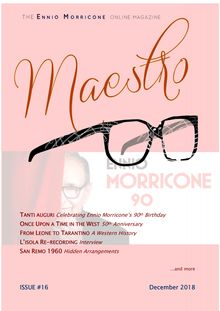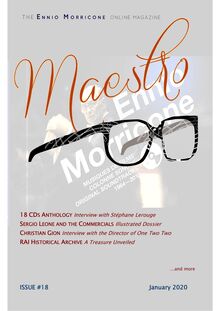-
 Univers
Univers
-
 Ebooks
Ebooks
-
 Livres audio
Livres audio
-
 Presse
Presse
-
 Podcasts
Podcasts
-
 BD
BD
-
 Documents
Documents
-
- Cours
- Révisions
- Ressources pédagogiques
- Sciences de l’éducation
- Manuels scolaires
- Langues
- Travaux de classe
- Annales de BEP
- Etudes supérieures
- Maternelle et primaire
- Fiches de lecture
- Orientation scolaire
- Méthodologie
- Corrigés de devoir
- Annales d’examens et concours
- Annales du bac
- Annales du brevet
- Rapports de stage
La lecture à portée de main
Tout savoir sur nos offres
Tout savoir sur nos offres

Description
NEWS: In breve, Old News, Web News - Didier Thunus, Patrick Bouster and Steven Dixon (5-15)
ODDITY: Sad Hill Cemetary Association - Keith Brewood (16)
SCORE REVIEW: La corrispondenza - Patrick Bouster (17-21)
DOSSIER: The Hateful Eight - Lucas Giorgini, Steven Dixon and Didier Thunus (22-37)
ODDITY: The Ennio Morricone Room: One Night at the 123 Sebastopol - Didier Thunus (38,39)
DOSSIER: Negrin-Morricone, A 25-Year Close Collaboration - Part 2: Infanzia e guerra [2000-2006] - Patrick Bouster (40-46)
ANALYSIS: Fabulosi parlari, or Notes and Ideas for an Unfinished Morriconian Symphony - 2 of 2 - Randolph Carter (47-64)
Sujets
Informations
| Publié par | didier_thunus |
| Publié le | 17 juillet 2016 |
| Nombre de lectures | 15 |
| Licence : |
En savoir + Paternité, pas d'utilisation commerciale, partage des conditions initiales à l'identique
|
| Langue | English |
| Poids de l'ouvrage | 3 Mo |
Extrait
AN OSCAR FOR ENNIO Justice is Done
THE HATEFUL EIGHT Complete Dossier
LA CORRISPONDENZA A Virtual Romance
123 SEBASTOPOL One Night in the Ennio Morricone Room
...and more
ISSUE #10 March 2016Table of Contents
Preface: The Return of 3 Iconic Masters.................................................................................... 3
In breve....................................................................... 5
Old News.................................................................. 13
Web News 15
Sad Hill Cemetary Association ................................ 16
La corrispondenza .................................................................................... 17
The Hateful Eight..................... 22
The Ennio Morricone Room: One Night at the 123 Sebastopol.............. 38
Negrin-Morricone, A 25-Year Close Collaboration - Part 2: Infanzia e guerra (2000-2006).. 40
Fabulosi parlari or Notes and Ideas for an Unfinished Morriconian Symphony - 2 of 2......... 47
License for all articles: CreativeCommons
Cette œuvre est mise à disposition selon les termes de la Licence Creative Commons Attribution
- Pas d’Utilisation Commerciale - Partage dans les Mêmes Conditions 2.0 Belgique
PUBLICATION PÉRIODIQUE D'ÉTUDE ET DE CRITIQUE DANS LE DOMAINE ARTISTIQUE. LES TEXTES
SONT PUBLIÉS SOUS LA RESPONSABILITÉ DE LEURS AUTEURS, QUI EN CONSERVENT LA PROPRIÉTÉ
DES DROITS D'AUTEUR ET INTELLECTUELS.
All the articles are of purely informative nature. We do not own the copyright of the images
included in this document or of the audio clips accessible from it. All the rights on the images
and the music are the property of their respective owners.
Chief editors: Patrick Bouster and Didier Thunus
Front cover design: Valeria Magyar
Front cover inlay: Anne-Catherine MortiauxMAESTRO – THE ENNIO MORRICONE ONLINE MAGAZINE ISSUE #10 MARCH 2016
P REFACE
The Return of 3 Iconic Masters
The Graceful Eighty
by Patrick Bouster
At the end of 2015, three film music icons are in the foreground once again: Michel Legrand,
John Williams and Ennio Morricone. They are from the same generation, more than eighty
years old now, and all three have marked the audience since the Sixties. Their art is part of the
history of cinema and, for some of them, of popular songs or contemporaneous music. They’re
still adding their touch to the cinema, to their art in general. All three of them, curiously, are
back after a period of silence of about 2 years.
Legrand, who didn't write a film score since 2009, made an exception in 2014 for La rançon
de la gloire. But nothing else apart from some usual
concerts. He recently produced a CD “Michel Legrand et
ses amis” (Michel Legrand and friends), issued in
November 2015, marking his return to the songs, through
revisions of film music. The CD, nostalgic, sentimental,
touching, is for a good part very enjoyable, for another part
not dazzling. Like many songs or pop-jazz-oriented albums
by Legrand, this one can safely be played with family and
friends (not too young, though!). Through this year 2016,
he tours with male singer Vincent Niclo and a big band –
he keeps having projects. He recently declared (talking
about an upcoming CD with a female singer): “I have about
300 unreleased songs”.
In the few years before Star Wars - The Force Awakens, Williams wrote only one soundtrack,
for The Book Thief, released in 2013. So a new Star Wars episode was a big return, always a
worldwide event. Moreover, William's music perfectly integrates the saga, closely associated
to it, since the first and second episodes (1977, 1980). He created a musical world, its own
mythology. Who didn't shiver hearing the main theme, or the Imperial March or Throne Room?
Of course, it adds quality to the series, but above all, an
identity. The versatile composer, inspired by Russian ones,
was the best fit for the purpose. He was involved in the saga's
music for 40 years, which is unique in the cinema history. This
genre of soundtracks is made up of two very distinct parts: the
epic, ample, solemn, fascinating themes enhancing the saga,
and the functional ones, up tempo, dissonant, incidental. Its
7th episode possesses these two characteristics, although less
prominent in the first category. That is maybe why he didn't
get another Oscar, but above all because he already got 5 of
them.
3MAESTRO – THE ENNIO MORRICONE ONLINE MAGAZINE ISSUE #10 MARCH 2016
Ennio Morricone didn't release a score since
Come un delfino La serie (2013, but likely
written in 2012). Before that, his creation had
mainly contributed to TV movies and few
feature films. He resumed his work (with the
interlude for Missa Papae Francisci) with En
mai, fais ce qu'il te plaît and The Hateful Eight
in 2015. So also for him, Tarantino's film marked
his great international return in late 2015. The
director had been waiting for him, and provides
him more visibility along the way, his films
being distributed worldwide. His score renews in
a certain way his writing, avoiding clichés from
his western mythology and even his gimmicks.
Fully symphonic, with of course some
indisputable elements of signature (the
syncopated and up-tempo instruments fighting each other in L'inferno bianco, jerky and
obsessive little motives, suddenly moving faster in L'ultimo diligenza..., for instance), the music
marks, surely not deliberately, a milestone, a pivot point, thanks to the desire of creating
something special.
It has been celebrated by an Oscar, landmarking the first real collaboration between the two
artists and also to make up for the great injustice of not having had an Oscar until 2016,
especially for The Mission and certainly other titles not even nominated (suffice to cite Once
Upon a Time in America and Mission to Mars).
Let’s go back to our 3 masters. Why are they all above 80? Because the other ones either are
sadly dead, or aren't world-authors, or no longer in activity. The great and elegant Lalo Schifrin
and Sir John Scott, oddly never rewarded by the Academy Award, would now deserve at least
an honorary Oscar. So let's pay homage to the living creators whose milestone art has been
delighting us for so many decades, and hoping they still will in the future.
Finally, in the past year 2015, some cinema artists linked to Italy and film music passed away.
Let’s pay tribute to (incomplete list):
Directors Francesco Rosi, Mario Caiano, Sergio Sollima,
Actors Gabriele Ferzetti, Michel Galabru,
Composers Gérard Calvi, James Horner, Pierre Jansen (*).
(*) Taking apart Pierre Boulez, who despised music for films, maybe because it was applied and not
“pure”, and didn’t understand Maurice Jarre's artistic path, his esteemed colleague. This illustrates the
difference between theoretical music aimed at few often snobbish people and real practice of art for the
pleasure and the emotion of the audience.
4MAESTRO – THE ENNIO MORRICONE ONLINE MAGAZINE ISSUE #10 MARCH 2016
N EWS
In breve
Awards and Nominations
Only a year ago, nothing had foreshadowed the outburst of honors that have now crowned the
Maestro’s career. It is amazing how the “little voice” in Tarantino’s head turned this quiet and
discreet period into a worldwide consecration. The Hateful Eight may not be Morricone’s best
score (the music will be debated in full from page 22 onwards), but awarding it with an Oscar
is far from shocking, even regardless of the age of the composer and the originality of the feat,
which have most likely influenced the voters. By all means, it is a finer film score than Herbie
Hancock’s ‘Round Midnight (with all due respect). And the world started to wonder why he
never got one before. Unbelievable, alright, but that’s history now. 28/2/2016 will remain
engraved in the annals of film music as the day where justice was made – Yes, Ennio
Morricone’s got his Oscar!
He was blessed with a standing ovation – not such a frequent thing at the Oscars – and received
the award from the hands of Quincy Jones and Pharrell Williams. His speech, pronounced with
a voice full of tears, was short and fitting. Not mentioning anything of course about the tardiness
of the award, he congratulated his co-nominees and thanked Tarantino. And just like in 2007,
he dedicated his Oscar to his wife Maria. The translation was provided by his son Giovanni. I
was amazed by how stoic Ennio’s son was able to remain (it’s an Oscar, right? I was much
more ecstatic when my father won a sports trophy in our small village).
And the Maestro became the man of all records: the oldest artist to receive an Oscar (beating
Christopher Plummer who had been awarded one in 2012 for his supporting role in Beginners,
at the age of 82), and the only artist having received an Oscar after having been awarded an
honorary Academy Award.
Yet only 2 days before, the French-speaking Morricone fans had had to undergo a cruel
5MAESTRO – THE ENNIO MORRICONE ONLINE MAGAZINE ISSUE #10 MARCH 2016
anticlimax at the César ceremony. En mai fais ce qu’il te plaît had flopped at the box-offices
(because of bad reviews and terrorist attacks aftershock) but got one single nomination for the
César, for Ennio’s original score. Enough to believe that the French planne
-
 Univers
Univers
-
 Ebooks
Ebooks
-
 Livres audio
Livres audio
-
 Presse
Presse
-
 Podcasts
Podcasts
-
 BD
BD
-
 Documents
Documents
-
Jeunesse
-
Littérature
-
Ressources professionnelles
-
Santé et bien-être
-
Savoirs
-
Education
-
Loisirs et hobbies
-
Art, musique et cinéma
-
Actualité et débat de société
-
Jeunesse
-
Littérature
-
Ressources professionnelles
-
Santé et bien-être
-
Savoirs
-
Education
-
Loisirs et hobbies
-
Art, musique et cinéma
-
Actualité et débat de société
-
Actualités
-
Lifestyle
-
Presse jeunesse
-
Presse professionnelle
-
Pratique
-
Presse sportive
-
Presse internationale
-
Culture & Médias
-
Action et Aventures
-
Science-fiction et Fantasy
-
Société
-
Jeunesse
-
Littérature
-
Ressources professionnelles
-
Santé et bien-être
-
Savoirs
-
Education
-
Loisirs et hobbies
-
Art, musique et cinéma
-
Actualité et débat de société
- Cours
- Révisions
- Ressources pédagogiques
- Sciences de l’éducation
- Manuels scolaires
- Langues
- Travaux de classe
- Annales de BEP
- Etudes supérieures
- Maternelle et primaire
- Fiches de lecture
- Orientation scolaire
- Méthodologie
- Corrigés de devoir
- Annales d’examens et concours
- Annales du bac
- Annales du brevet
- Rapports de stage
